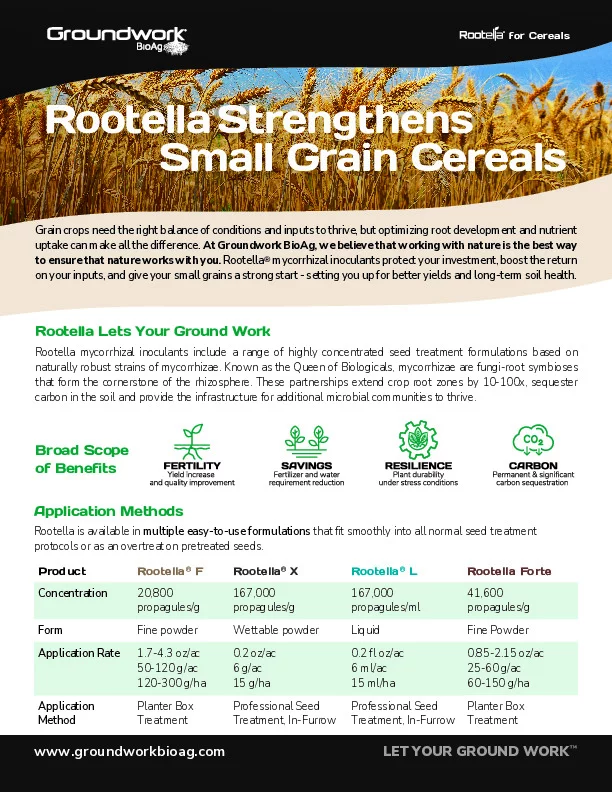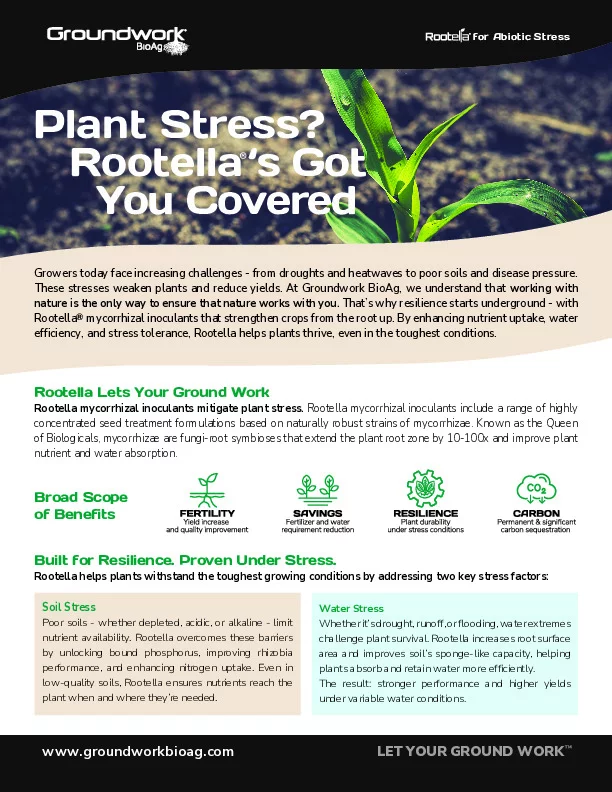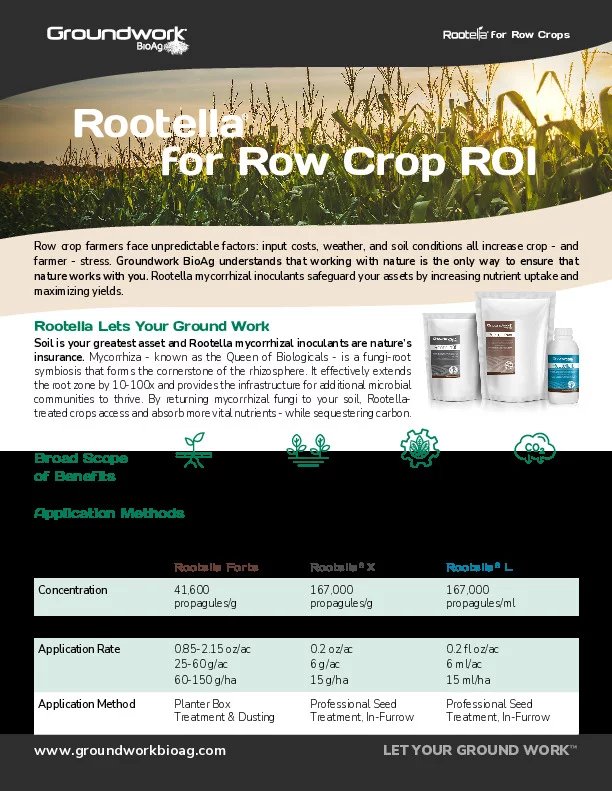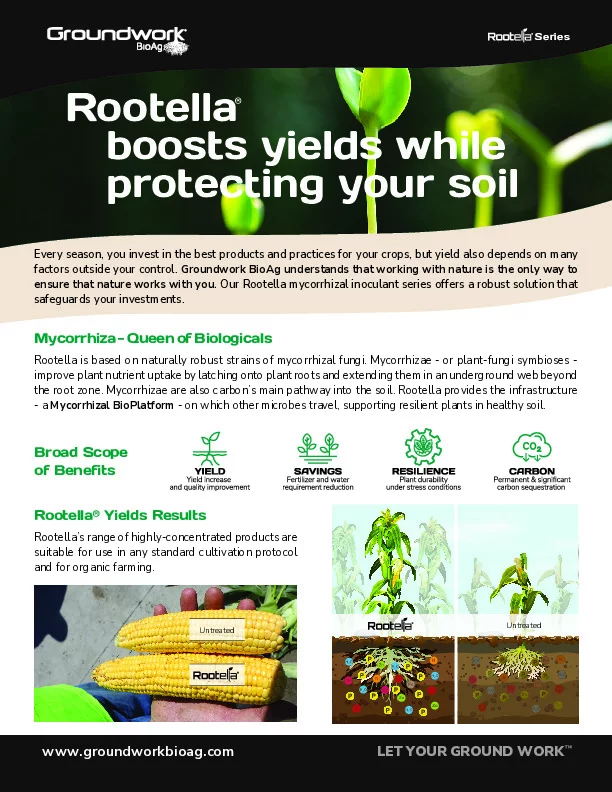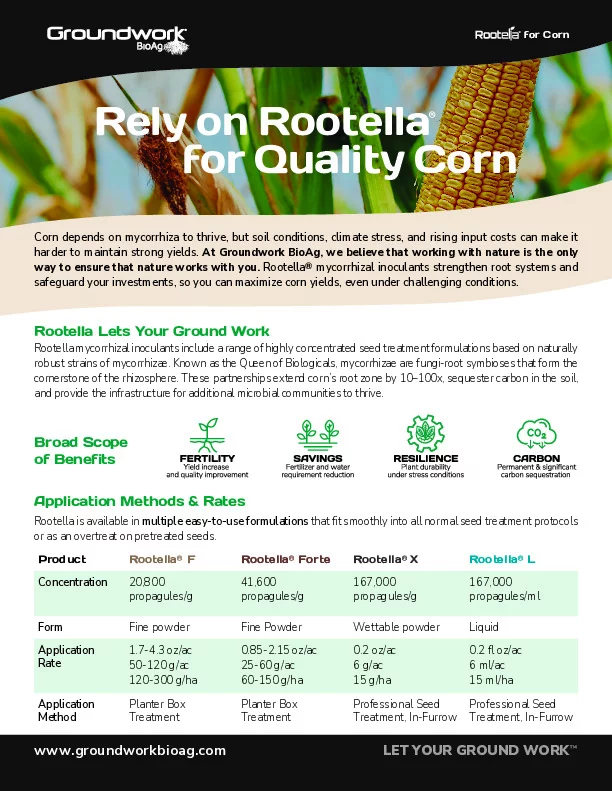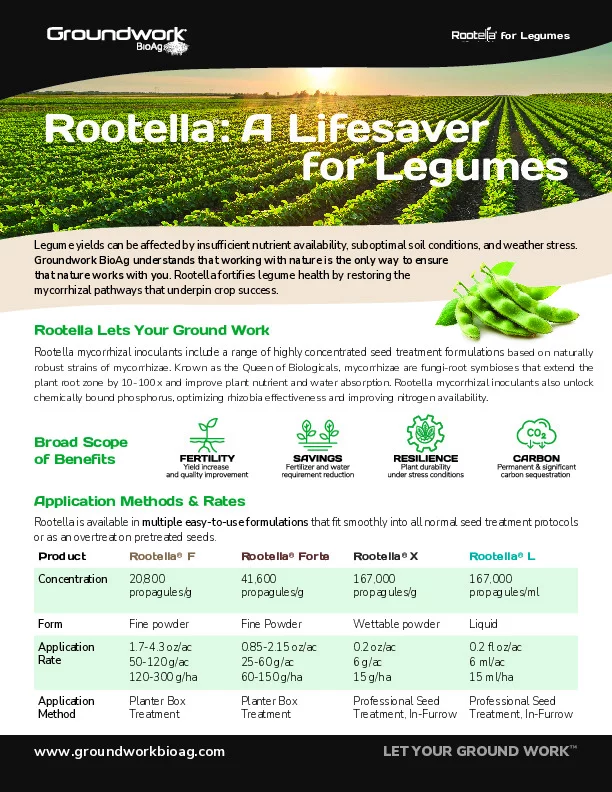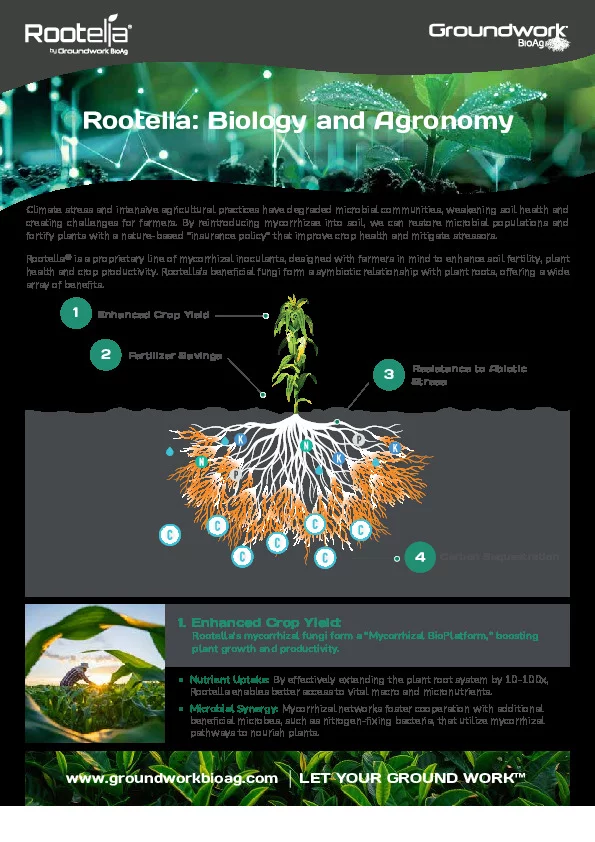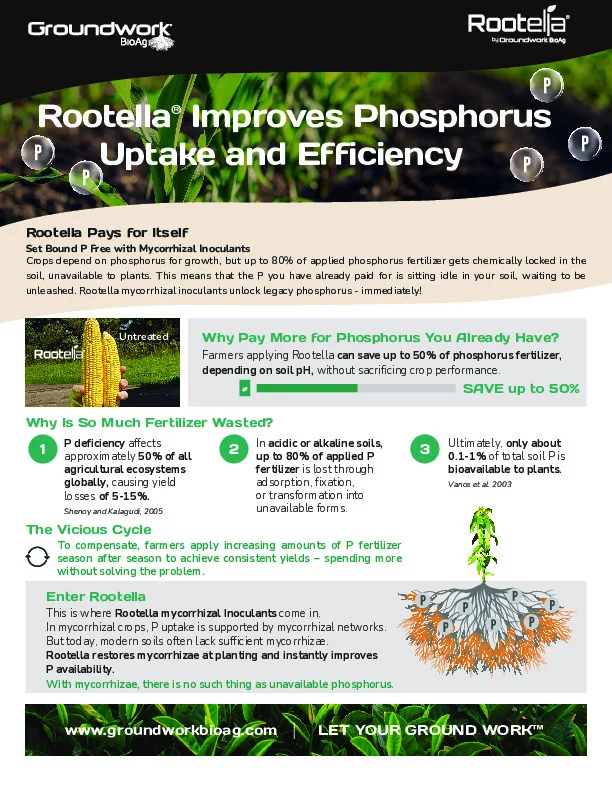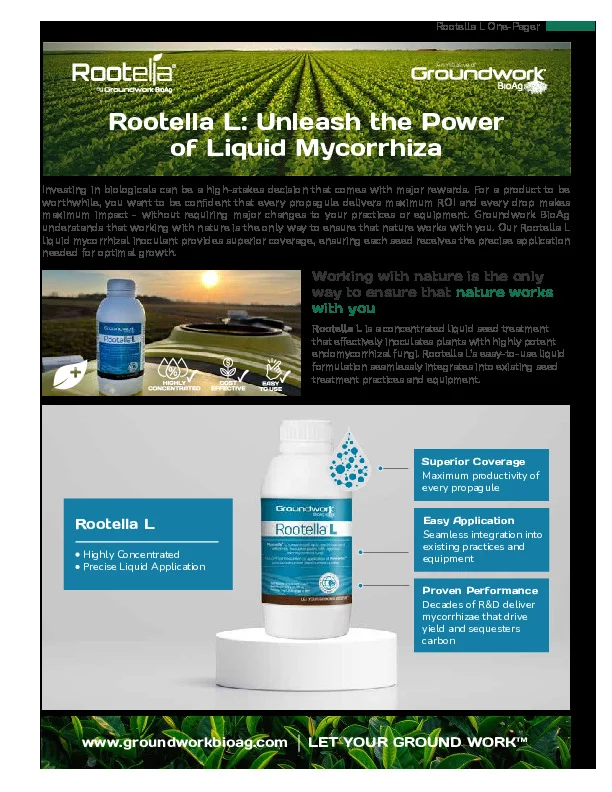Mycorrhiza is a symbiosis between fungi (myco-) and plant roots (-rhiza). These beneficial fungi-root relationships – known as mycorrhizal fungi – form the cornerstone of the rhizospheric ecosystem. Mycorrhizae effectively extend the plant root zone by 10-100x and provide the infrastructure for additional microbial communities to thrive. The mycorrhizal networks extend the root system, supporting the growth of up to 90% of all plant species, enhancing nutrient absorption, diminishing fertilizer requirements, reviving soil health and permanently sequestering carbon.
Rootella®
Mycorrhizal Inoculants
Highly-Effective Mycorrhizal Inoculants
Rootella® is a family of mycorrhizal inoculants that are exclusively developed and produced by Groundwork BioAg®. Grounded in science and perfected over time, Rootella® forms fungal mycelia that attach to and effectively extend root networks.
The mycelia (hyphae) help plants absorb water and soil nutrients. Groundwork BioAg®’s unique mycorrhizal strains and production methods are the product of over thirty years of research and development, which began in Israel’s renowned Volcani Institute (ARO). Years of breeding, research, and field trials have resulted in robust and effective mycorrhizal products, based on vigorous strains originally derived from harsh Israeli desert conditions.
Broad Scope of Benefits
Years of research have shown that mycorrhizal inoculation provides a wide range of benefits:
Rootella Working Mechanism Biology and Agronomy in Action
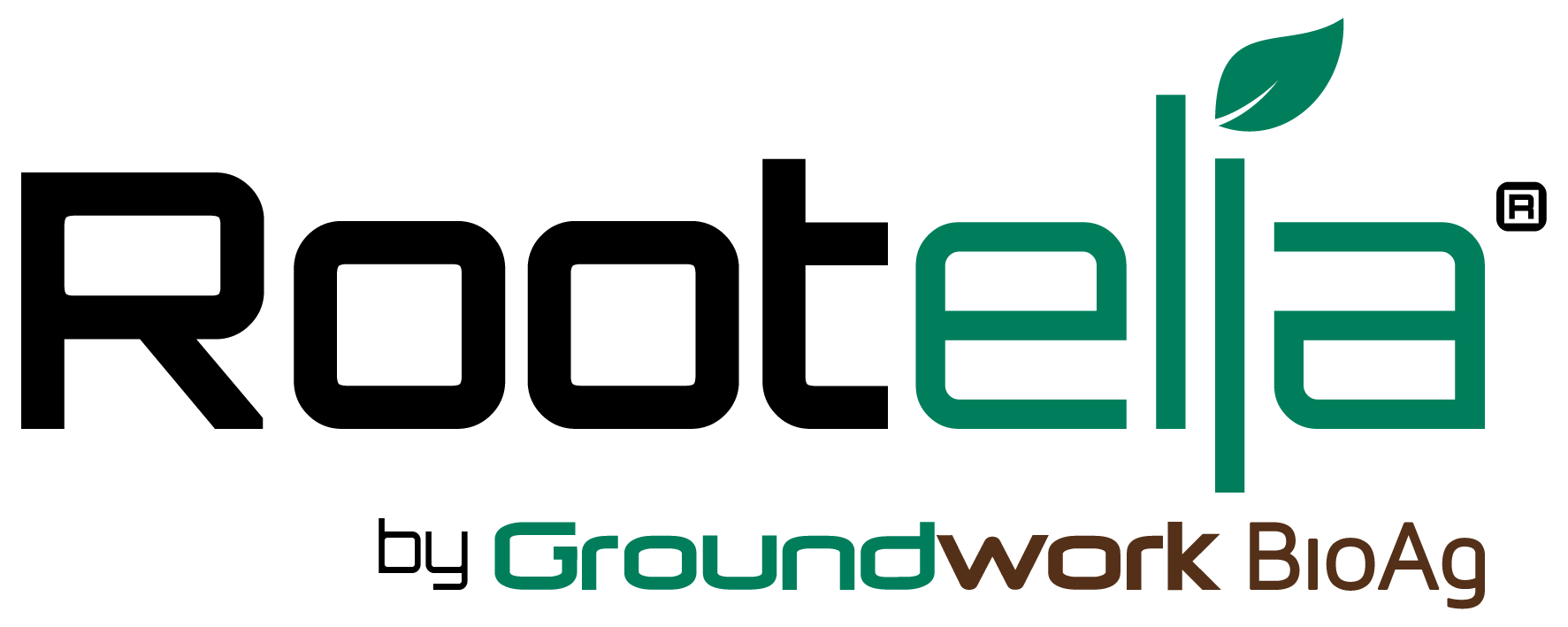
Find Your Closest Rootella® Dealer
Enter your ZIP Code (US)/Postal Code (Canada) below to find authorized retailers near you.
If you are located outside North America, or cannot find a local dealer, please contact our sales team directly for purchase options.
Frequently Asked Questions
Rootella® mycorrhizal inoculants are the result of a proprietary process that yields cost-effective and highly concentrated products. Rootella®’s unusually high concentrations of up to 167,000 viable propagules per gram offer the following benefits:
- Cost-effectiveness: High propagule concentrations enable high efficacy at low application rates
- Seed treatment applicability: Effective seed treatment requires high application rates in terms of propagules per seed. This can only be achieved via a film coating with high product concentration
- Stress-resistance: Rootella is derived from potent strains of naturally occurring endomycorrhizae. Plants growing with the support of the mycorrhizal network exhibit higher resilience in the face of stressors such as drought, soil salinity and pathogens
- Climate-smart: Rootella® enables farmers to sequester carbon permanently in their soils. Carbon sequestered by mycorrhizal fungi is stable and measurable – offering farmers carbon revenue and mitigating the Earth’s climate challenges
Yes.
Most Rootella® products are suitable for organic farming and have earned a range of global certifications. Please see our Rootella Product page for more information.
No.
Rootella® products contain only naturally occurring, non-GMO fungi.
Up to 90% of all plant species are considered mycotrophs, plants that benefit from mycorrhizal symbiosis. Non-mycotrophs, such as rapeseed, repel mycorrhizae. Facultative mycotrophs, such as soybean, benefit from mycorrhizae, but may also thrive under certain conditions without any. Obligate mycotrophs, such as corn, require mycorrhizae to grow optimally. Please see Rootella crop compatibility for a detailed list of all major crops.
Rootella® products are easy to apply and require no additional changes in cultivation methods. The formulations and methods are tailored to a variety of crops and growing conditions. Please visit the Rootella Products page for more information.
Depending on the crop, soil type and weather conditions, effective Rootella® inoculation may become apparent within 1-2 months. Visual differences may include faster plant growth, heavier fruit weight, richer plant color, and fewer signs of stress compared to non-inoculated plants.
Many pesticides, including fungicides, are compatible with Rootella. To ensure compatibility with other treatments, please look at our Rootella® Compatibility Tool or reach out with any questions.
Modern cultivation methods destroy natural mycorrhizae, and thus without inoculation, your soil is unlikely to host significant populations of mycorrhizal fungi. Regenerative agricultural techniques help to restore and regenerate mycorrhizae from season to season, but application of effective mycorrhizal strains is important to enjoy the host of benefits that mycorrhizal inoculation can provide: yield increase, fertilizer savings, plant resilience, and carbon sequestration. Rootella is highly efficacious and should inoculate your crops quickly and effectively, to reach positive results season after season, regardless of your cultivation methods. Over-inoculation is not possible, due to plants’ natural autoregulation.
Most fertilizers and composts are compatible with mycorrhizae, though extreme over-fertilization with starter phosphorus fertilizers may inhibit mycorrhizal inoculation. Please consult with us for specific questions.
Mycorrhizae are carbon’s main pathway into the soil.
Mycorrhizal fungi provide precious nutrients to plants, and the plants return the favor with photosynthesized sugars (carbohydrates), which become carbon. Mycorrhizal inoculation, the most effective method of restoring microbial communities into agricultural ecosystems, promises to permanently draw down that carbon back where it belongs – in our soil.

